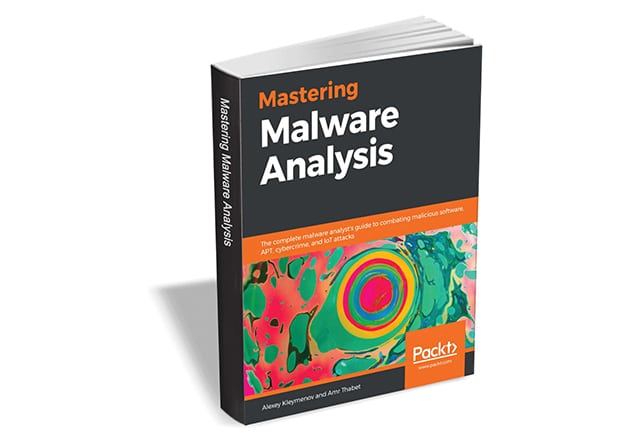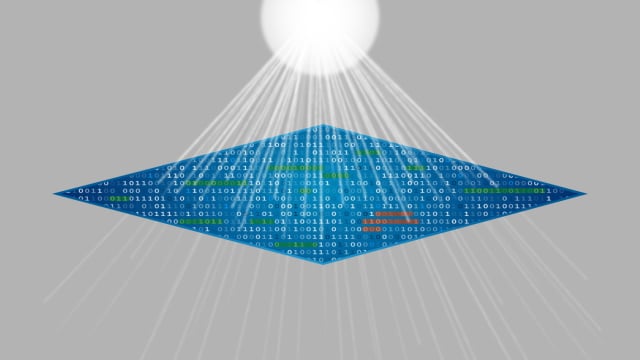
Malware attacks using machine identities continue to increase
Malware attacks using machine identities doubled from 2018 to 2019 and have increased eight fold over the last decade.
New threat analysis from machine identity management company Venafi looks at security incidents and third-party reports in the public domain, including high-profile campaigns such as, TrickBot, Skidmap, Kerberods and CryptoSink.

Get 'Mastering Malware Analysis' ($39.99 value) FREE for a limited time
With the ever-growing proliferation of technology, the risk of encountering malicious code or malware has also increased. Malware analysis has become one of the most trending topics in businesses in recent years due to multiple prominent ransomware attacks. Mastering Malware Analysis explains the universal patterns behind different malicious software types and how to analyze them using a variety of approaches.
You will learn how to examine malware code and determine the damage it can possibly cause to your systems to ensure that it won't propagate any further. Throughout the course of this book, you will explore real-world examples of static and dynamic malware analysis, unpacking and decrypting, and rootkit detection. By the end of this book, you will have learned to effectively analyze, investigate, and build innovative solutions to handle any malware incidents.

Malware attacks down as ransomware increases
The latest Cyber Threat Report from SonicWall shows a 24 percent drop in malware attacks worldwide, while there’s been a 20 percent jump in ransomware globally and a 109 percent spike in the US.
There's also been a 176 percent increase in malicious Microsoft Office file types and a 50 percent rise in IoT malware attacks as cybercriminals seek to use devices as a backdoor to business networks via home workers.

Microsoft launches Project Freta to detect malware in Linux kernels
Microsoft has revealed a new anti-malware service by the name of Project Freta. The company describes it as a "free service from Microsoft Research for detecting evidence of OS and sensor sabotage, such as rootkits and advanced malware, in memory snapshots of live Linux systems".
Project Freta is cloud-based, and the memory forensics tool was created by the NExT Security Ventures (NSV) team in Microsoft Research.

How pre-installed adware can cause trouble for mobile users
New analysis carried out by Kaspersky of attacks on mobile devices has revealed that 14.8 percent of its users who were targeted by malware or adware in 2019 suffered a system partition infection, making the malicious files undeletable.
It also finds that pre-installed default applications have role to play, depending on the brand, the risk of applications that can't be deleted varies from one to five percent in low-cost devices and goes up to 27 percent in extreme cases.

Malware incidents decline 23 percent in 2019
European managed security services company Orange Cyberdefense today reveals the findings of its inaugural Security Navigator, which shows a 23 percent decline in the number of recorded malware incidents in 2019.
The total number of security events have, however, increased. The company analysed 263,109 events from data obtained from its 10 CyberSOCs and 16 SOCs. Out of these events it identified 11.17 percent as verified security incidents. This represents a 34.4 percent increase over the previous year's rate of 8.31 percent.

Two thirds of malware is invisible without HTTPS inspection
A new report from WatchGuard Technologies shows that 67 percent of all malware in the first quarter of this year was delivered via HTTPS, so organizations without security solutions capable of inspecting encrypted traffic will miss two-thirds of incoming threats.
In addition, 72 percent of encrypted malware was classified as zero day (meaning no antivirus signature exists for it, and it will evade signature-based protections). The findings suggest that HTTPS inspection and advanced behavior-based threat detection and response solutions are now requirements for every security-conscious organization.

Fake job applications used to steal banking credentials
During May, researchers at Check Point have seen a doubling in the number of malicious files sent by email claiming to be resumes or CVs from individuals, as hackers exploit the unemployment and remuneration schemes resulting from the COVID-19 pandemic.
In addition they have noted that seven percent of domains registered containing the word 'employment' are malicious. There has also been a 16 percent increase in malware attacks overall, compared to March and April.

Excel vulnerability aids delivery of malware
Microsoft office files have long been used as a means of delivering malware payloads and researchers at Mimecast have discovered a rise in LimeRAT malware delivered using an Excel default password.
Excel files are designed to be easily encrypted, which helps attackers evade detection by common malware detection systems when a file is emailed.

Gift card scam sends out malicious USB drives
Malware attacks using USB flash drives dropped in offices or public locations like car parks are not uncommon. But researchers at Trustwave Spiderlabs have been investigating a new attack disguised as a gift card.
The attack came in the form of a letter that appears to be from retail chain Best Buy offering a $50 gift to loyal customers. With the letter comes a USB drive supposedly containing a list of items to spend the money on.
Click-fraud malware found lurking in more than 50 Play Store apps
Researchers at Check Point have identified an auto-clicker malware family operating inside the Google’s Play Store.
Disguised in over 56 applications and downloaded over 1,000,000 times globally, the malware -- dubbed 'Tekya' -- commits mobile ad fraud by imitating the actions of a user, clicking ads and banners from ad agencies like Google's AdMob, AppLovin', Facebook, and Unity.

Cybercriminals exploit coronavirus fears to spread malware
January's Global Threat Index from Check Point Research shows that Emotet remains the top threat for the fourth month in a row. But it’s now being spread by a spam campaign exploiting people's worries about the coronavirus.
The emails appear to be reporting where Coronavirus is spreading, or offering more information about the virus, encouraging the victim to open the attachments or click the links which, if opened, attempt to download Emotet on their computer. Emotet is primarily used as a distributor of ransomware or other malicious campaigns.

Mobile malware incidents increase by 142 percent
According to a new study, 36.5 percent of all organizations have experienced a malware incident on a mobile device in the past year, which represents a 142 percent increase from 2018.
Research from mobile security specialist Wandera finds 57 percent of organizations have experienced a mobile phishing incident, with 60 percent of mobile phishing attacks occurring over HTTPS.

Foreign currency specialist Travelex suspends some services after cyber attack
Travelex, the London-based foreign exchange company, has suspended some of its services and taken its UK website offline following a cyber attack that took place on New Year's Eve.
A malware infection caused the company to take the decision to cut the cord on its services. It said that this was merely a "precautionary measure" which was done "in order to protect data". The suspension of services has caused problems for customers around the world and has had a knock-on effect for other companies including Tesco Bank and Asda.

Malwarebytes AdwCleaner 8.0 unveils refreshed UI to better deal with pests
Less than a month after unveiling MBAM 4.0, Malwarebytes has released Malwarebytes AdwCleaner 8.0, a major new version of its standalone adware-cleaning tool.
AdwCleaner 8.0 updates its optional in-app installer to ensure the latest version of Malwarebytes is installed going forward, plus drops support for Windows XP and Vista. Its UI has also been refreshed to chime with MBAM 4.0’s.
